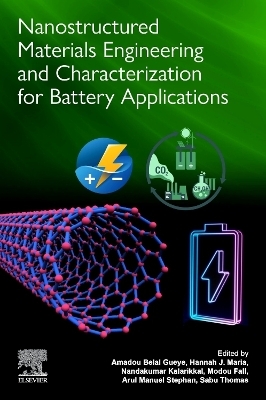
Nanostructured Materials Engineering and Characterization for Battery Applications
Elsevier - Health Sciences Division (Verlag)
978-0-323-91304-1 (ISBN)
Amadou Belal Gueye is a Research Scholar at the School of Chemical Sciences, Mahatma Gandhi University, Kottayam, India. He received his bachelor’s degree in physics-chemistry and his master’s degree in physical chemistry applied to energy and analysis, from Cheikh Anta Diop University, Dakar, Senegal. He works in the field of lithium/sulfur batteries. Dr. Hanna J. Maria is a Senior Researcher at the International and Inter University Centre for Nanoscience and Nanotechnology, Mahatma Gandhi University, India. She previously held postdoctoral research positions at the Centre for Advanced Materials, Qatar University, the Department of Mechanical Engineering, Yamaguchi University, Japan, the Centre RAPSODEE, IMT Mines, Albi, France, and the Siberian Federal University, Krasnoyarsk, Russia. Dr. Maria has published 20 articles and 10 book chapters, and co-edited 4 books. Her research has focused on natural rubber composites and their blends, thermoplastic composites, lignin, nanocellulose, bio-nanocomposites, nanocellulose, rubber-based composites and nanocomposites, and hybrid nanocomposites. Dr. Nandakumar Kalarikkal is an Associate Professor at the School of Pure and Applied Physics and Joint Director of the International and Inter University Centre for Nanoscience and Nanotechnology of Mahatma Gandhi University, Kottayam, Kerala, India. His research activities involve applications of nanostructured materials, laser plasma, and phase transitions. He is the recipient of research fellowships and associateships from prestigious government organizations such as the Department of Science and Technology and Council of Scientific and Industrial Research of the Government of India. He has active collaborations with national and international scientific institutions in India, South Africa, Slovenia, Canada, France, Germany, Malaysia, Australia, and the United States. He has more than 130 publications in peer-reviewed journals. He also co-edited nine books of scientific interest and co-authored many book chapters. Prof. Modou Fall is the Secretary General of the Senegalese Committee for Chemistry, Full Professor in the Department of Chemistry, Sciences and technologies Faculty, Cheikh Anta DIOP University of Dakar, Senegal. His main research interests include the synthesis, characterization and applications of conducting polymers, energy storage and conversion, corrosion studies and electroanalysis of hazardous compounds. He is the co-author of "General Physical Chemistry - Courses and exercises L1. Dr. Arul Manuel Stephan is a Senior Principal Scientist of Central Electrochemical Research Institute (CSIR- CECRI), Karaikudi, India. His area of interest focuses on advanced materials for lithium-ion and lithium sulfur batteries. He was associated with Prof. Yuri Saito at Osaka National Research Institute, Osaka, Japan under Japan Science and Technology Agency (JSPS) fellowship. Subsequently he was involved in the development of porous membranes for lithium-ion batteries at the Department of Chemistry, The University of Tulsa. He was the recipient of the most cited article award from European Polymer Journal and Best Paper Award from "Energy Storage Materials" in 2017. He has more than 110 publications. Prof. Sabu Thomas is a Professor of Polymer Science and Engineering and the Director of the School of Energy Materials at Mahatma Gandhi University, India. Additionally, he is the Chairman of the Trivandrum Engineering Science & Technology Research Park (TrEST Research Park) in Thiruvananthapuram, India. He is the founder director of the International and Inter-university Centre for Nanoscience and Nanotechnology at Mahatma Gandhi University and the former Vice-Chancellor of the same institution. Prof. Thomas is internationally recognized for his contributions to polymer science and engineering, with his research interests encompassing polymer nanocomposites, elastomers, polymer blends, interpenetrating polymer networks, polymer membranes, green composites, nanocomposites, nanomedicine, and green nanotechnology. His groundbreaking inventions in polymer nanocomposites, polymer blends, green bionanotechnology, and nano-biomedical sciences have significantly advanced the development of new materials for the automotive, space, housing, and biomedical fields. Dr. Thomas has been conferred with Honoris Causa (DSc) by the University of South Brittany, France.
SECTION 1: Introduction to energy storage systems and fundamentals
1. Electrochemical energy storage technologies: state of the art, case studies, challenges, and opportunities
2. Battery modeling
SECTION 2: Engineering of battery materials
3. Nanostructured cathode materials
4. Nanostructured electrolyte materials
5. Nanostructured functionalized separators
6. Nanostructured anode materials
7. Computational materials design of nanostructured materials for battery applications
SECTION 3: Battery characterization
8. Characterization of battery materials by electrochemical method
9. Characterization of battery materials by microscopy techniques
10. Characterization of battery materials by neutron scattering methods
11. Characterization of battery materials by X-ray methods
12. Characterization of battery materials by mechanical
13. Characterization of battery materials by surface spectroscopy methods
SECTION 4: Applications, practical considerations, and perspectives on batteries
14. Battery manufacturing—from laboratory to industry—challenges
15. Life cycle assessment of batteries
16. Battery applications
17. A simplified model to improve the performance of repurposed electric vehicle batteries
18. Fully green batteries
19. Integrated technologies and novel nanostructured materials for energy storage
20. Future of lignocellulosic biomassderived activated carbon for battery application
21. Artificial intelligence and machine learning in battery materials and their applications
| Erscheinungsdatum | 22.08.2024 |
|---|---|
| Verlagsort | Philadelphia |
| Sprache | englisch |
| Maße | 152 x 229 mm |
| Gewicht | 1130 g |
| Themenwelt | Technik ► Elektrotechnik / Energietechnik |
| Technik ► Maschinenbau | |
| ISBN-10 | 0-323-91304-0 / 0323913040 |
| ISBN-13 | 978-0-323-91304-1 / 9780323913041 |
| Zustand | Neuware |
| Haben Sie eine Frage zum Produkt? |
aus dem Bereich


